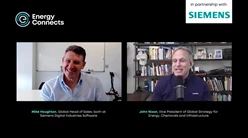Germany to Push EU to Extend Industry Free Permits to Emit CO2
(Bloomberg) -- Germany plans to push the European Union to soften emissions-reduction rules for its most polluting industries as the nation struggles to cope with higher energy costs.
EU emissions trading system rules are set to tighten next year, with more industries required to buy carbon certificates if they haven’t invested enough in cleaner technologies. Free allocations for those certificates will be stopped for the aviation sector and phased out for all industries in 2034, making fossil-fuel-intensive production more expensive.
Since the start of the trading system, some of the EU’s biggest polluters, like steelmakers, have received free allowances to emit CO2 into the atmosphere. Under the bloc’s plans to reach net-zero by mid century, it decided to phase out those permits and instead help protect industry through a carbon border levy in imported products like steel and cement, known as CBAM.
For Germany, that’s not enough. The country must find a solution with the European Commission for companies that can’t meet the bloc’s carbon-cutting targets, Economy Minister Katherina Reiche said at a reception organized by energy company RWE AG in Berlin on Wednesday night.
“We must extend the free allocation,” the minister said. “Otherwise we will lose essential industries in our country.”
Steelmaker ThyssenKrupp AG last month called for a slower phaseout of free allocations, while the mining, chemical, and energy trade union IGBCE said the rules risked “killing our businesses.”
The commission will also put forward rules to broaden the scope of products covered by CBAM, and crack down on circumvention by trading partners.
Germany is still trying to overcome a prolonged economic downturn, while struggling with higher US tariffs and elevated energy prices following Russia’s invasion of Ukraine. The country’s chemical plants operated at just 72% capacity in the second quarter, the weakest level in more than 30 years.
“The EU’s problem-solving attempt with CBAM will not work in more complex industries such as chemicals,” said Jens Burchardt, co-founder of Boston Consulting Group’s Center for Climate and Sustainability.
©2025 Bloomberg L.P.





